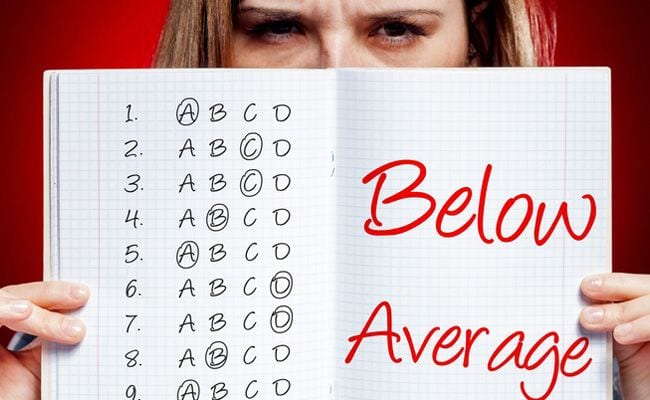
Above image: Evaluation below average image from Shutterstock.com.
Diane Ravitch answers four questions with Reign of Error, namely whether education in the United States is in crisis, whether it is declining and failing, what serves as evidence for reforms adopted by and promoted from the federal government and finally, what is being done to improve schools and the lives of children? It will come as little surprise to readers that there is an education crisis; there is surprise, however, in the reasons for that crisis.
Ravitch argues—and quite effectively—that the greatest threat to education in this country is the community of reformers who claim that they can “save” education by creating a more competitive climate in classrooms across the country. Equally frightening is the faith invested in test scores and the faith invested in teaching our children so that they become better at taking standardized tests but, ultimately, not necessarily making them better thinkers or even better students.
Ravitch’s tone throughout is impassioned, though she consistently steers clear of anger, even when some of the scenarios she describes might inspire that emotion in some writers. (And, indeed, many readers.) For just over 30 years now, parents, administrators, and teachers have come to believe in a “rising tide of mediocrity”, as described in a 1983 report called A Nation at Risk. The fear, of course, was that other nations were producing children more capable of acing tests and, by extension, more capable of making advancements in science in technology. How long, then, could America retain her rank among nations?
In successive decades various programs and philosophies have been bandied about, perhaps most famously George W. Bush’s controversial No Child Left Behind (NCLB). This, Ravitch writes, was passed off as “the Texas miracle”, a way of helping students rise to the top of the achievement heap. Teach to standards and the students will achieve those standards and if students achieve those standards, we will have gained in status and proven that American schools can succeed. That was the wisdom at least.
As schools failed to meet standards, the school would be examined, labeled “troubled” (and, by extension “failing”) and held up as an example of what was wrong with American education. The problem with this line of thinking was that students and teachers were given a nearly impossible task in terms of being able to achieve proficiency in the desired areas. (For the sake of our argument, proficiency might just as well be “perfection”.) Students with disabilities slanted the outcomes of some tests for certain schools and schools with heavy minority populations and/or in impoverished areas also tended to see poorer results on tests.
Ravitch’s extended argument follows a wisdom that has been repeated since at least the dawn of NCLB: Tests don’t tell the whole story, schools shouldn’t be closed because of low scores on standardized tests, there are good and bad teachers in every school system and even good ones have students who perform poorly; education extends beyond the boundaries of math and science and while those subjects are important, so are language, the arts, physical education, and history. Finally, the administration of education should be left to those who have experience in the classroom over an extended period of time and not those who are good at corporate thinking but who ultimately have little awareness of the myriad complicated factors that comprise each student’s overall performance.
Ravitch takes exception with the Teach for America program, suggesting that its interest in attracting “the best and the brightest” is perhaps noble but more often misguided as it creates a false sense of authority in its methods and ultimately does more harm than good in elevating national education. She is critical not just of NCLB but also the Obama administration’s Race to the Top, which she sees as in the new boss/same as the old boss light. She is also critical of the administration’s overall approach to education and the current national climate that believes charter schools are some kind of miracle answer to a problem that stretches back several decades.
Like others who have written on the issue of education Ravitch is aware of the link between poor academic performance and poverty. She also sees the question of quality education in impoverished areas as an issue of morality. Realistically, a quality education may not help children rise out of poverty. (In fact, the current cost of higher education may in fact enslave those who attempt to get ahead on a level that is ever deeper.) The point is not to expect that education will be a way out of poverty but that even in poverty one can be educated.
She argues for better prenatal care for women as a child’s development will, at all stages, impact his or her academic performance. Curriculums should be more balanced, regardless of the school system; in the tradition of the university, children should have exposure to the world of ideas at the broadest level which will in turn allow them to have their individual aptitudes recognized and allow them to become more integrated on the personal and intellectual fronts.
Further, class sizes should be kept smaller and personal to maximize each teacher’s effectiveness; moreover, education should not be treated like a high stakes game in a Las Vegas casino. The higher we raise the standards, it seems, the more we can expect students to fall short. It is right to expect excellence but within reasonable parameters.
Finally, there is a moral duty that comes with education: racial segregation, Ravitch writes, should be lessened or eliminated, not advanced, by our educational system.
She argues these points in language that is precise and lucid and supported with data that is both compelling and frightening. Moreover, she has given us a volume that should be read by parents, administrators, and teachers as well as the reformers who believe that America’s education system has moved into irreparable terrain.


![Call for Papers: All Things Reconsidered [MUSIC] May-August 2024](https://www.popmatters.com/wp-content/uploads/2024/04/all-things-reconsidered-call-music-may-2024-720x380.jpg)



